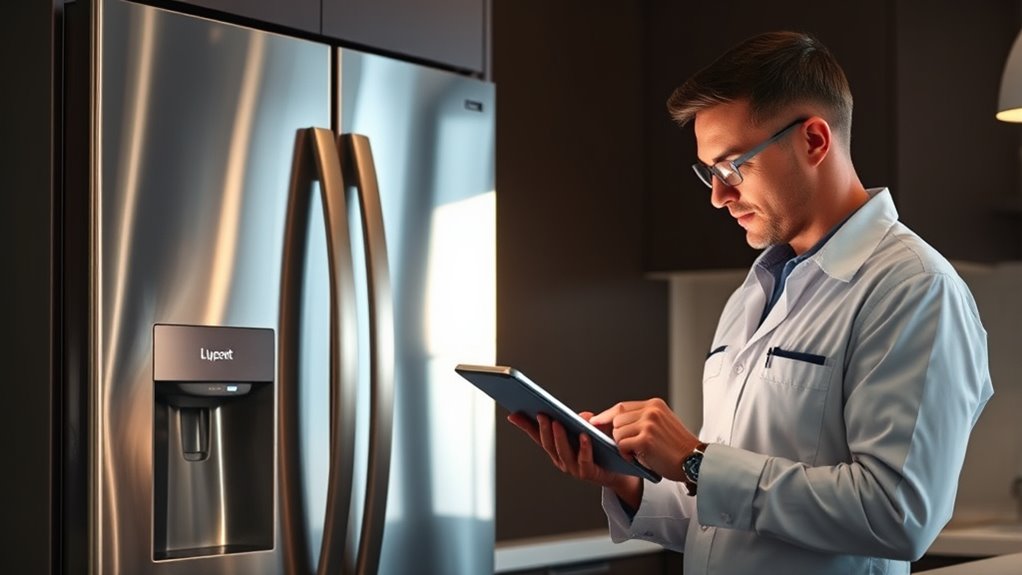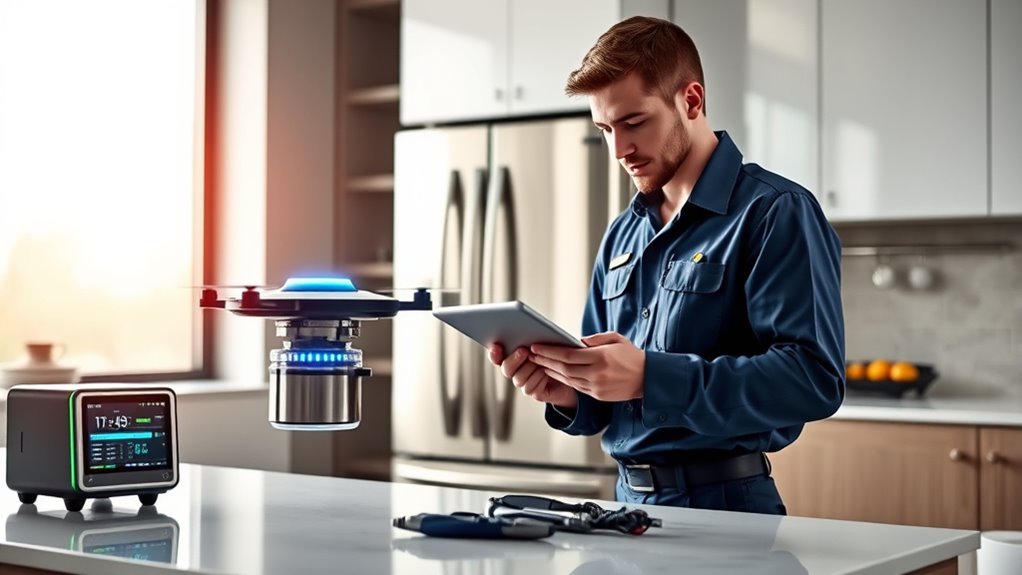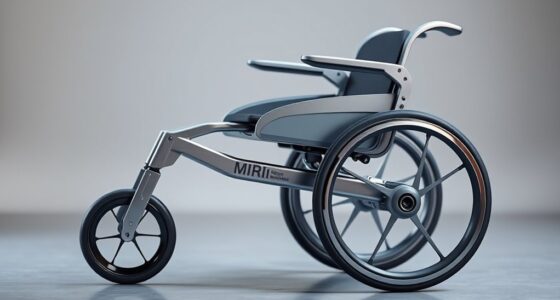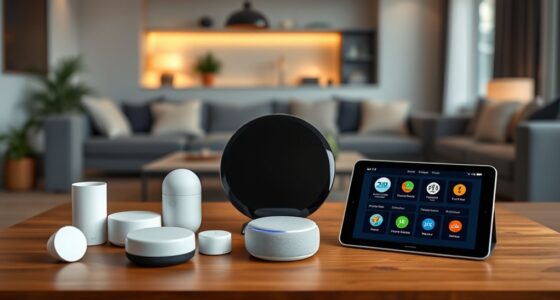Predictive maintenance helps you keep appliances running smoothly by using sensors to monitor performance in real time. It detects early signs of problems, like unusual vibrations or heat, before they cause breakdowns. Advanced data analysis predicts potential issues, allowing you to schedule repairs in advance, saving money and reducing stress. As these systems learn from ongoing data, they become more accurate over time. Keep going to discover how this technology can transform your household maintenance approach.
Key Takeaways
- Integrate sensors to continuously monitor appliance performance and detect early signs of wear or malfunction.
- Use data analytics to analyze sensor data for patterns indicating potential issues before failures occur.
- Employ predictive models that learn from historical data to improve accuracy in forecasting appliance failures.
- Schedule maintenance proactively based on real-time alerts, reducing downtime and costly repairs.
- Extend appliance lifespan and efficiency by replacing reactive repairs with timely, data-driven maintenance interventions.

Predictive maintenance is transforming how you care for your appliances by detecting potential issues before they cause breakdowns. Instead of waiting for a device to fail or relying on scheduled repairs, this approach uses advanced technology to monitor your appliances in real-time. Central to this process is sensor integration, where sensors are embedded into appliances to continuously gather data on their performance. These sensors detect subtle changes in temperature, vibration, power consumption, or other operational parameters, providing a constant stream of information that helps identify early signs of wear or malfunction.
Once the data is collected, data analytics comes into play. Sophisticated algorithms analyze the information, looking for patterns or anomalies that indicate a potential issue. For example, if a washing machine’s vibration sensors detect an imbalance that deviates from normal operation, data analytics can flag this as a possible problem. By interpreting these signals, you can be alerted to maintenance needs well before a breakdown occurs, saving you time and money. This proactive approach minimizes downtime and extends the lifespan of your appliances, making your household more efficient and less stressful.
Data analytics detects anomalies early, preventing breakdowns and extending appliance lifespan through proactive maintenance.
Sensor integration isn’t just about collecting data; it’s about ensuring that the information is accurate, timely, and actionable. Modern sensors are designed to be highly sensitive yet durable, providing reliable readings over long periods. These devices communicate seamlessly with your home’s network, enabling real-time monitoring via smartphone apps or centralized control systems. As a result, you’re empowered to receive alerts, schedule maintenance, or even troubleshoot issues remotely. This connectivity simplifies appliance management and reduces the guesswork involved in traditional maintenance schedules.
Data analytics also plays a vital role in predictive maintenance by enabling predictive modeling. These models learn from historical data, understanding normal performance patterns, and identifying deviations that suggest impending failure. Over time, this continuous learning process improves the system’s accuracy, ensuring that you get timely notifications and maintenance recommendations. You can also leverage local business hours to plan your maintenance visits more effectively, avoiding peak times and ensuring prompt service. You no longer need to rely solely on routine inspections or reactive fixes, which can be costly and inconvenient. Instead, you can address problems early, often before they become noticeable or damaging.
Incorporating sensor integration and data analytics into your appliances transforms maintenance from a reactive chore into a strategic, data-driven process. You gain peace of mind knowing your appliances are constantly being monitored, and issues are addressed proactively. This technology not only enhances the longevity and efficiency of your appliances but also helps you save money and avoid unexpected disruptions. As predictive maintenance continues to evolve, it’s clear that your appliances will become smarter, more reliable, and easier to manage.
Frequently Asked Questions
How Accurate Are Predictive Maintenance Systems for Appliances?
Predictive maintenance systems for appliances are quite accurate, especially when sensor accuracy and data reliability are high. You can trust these systems to detect potential issues early, reducing breakdowns. However, their effectiveness depends on the quality of sensors and data input. When sensors are precise and data is consistent, these systems provide reliable predictions, helping you maintain appliances efficiently and avoid unexpected repairs.
What Is the Initial Cost of Implementing Predictive Maintenance?
The initial cost of implementing predictive maintenance varies based on your appliance types and system complexity, but generally, you should conduct a thorough cost analysis to weigh expenses against long-term investment benefits. While upfront costs include sensors, software, and setup, you’ll save money through reduced downtime and repairs. This approach offers a strategic investment that can enhance appliance lifespan and efficiency, making the initial expenditure worthwhile over time.
Can Predictive Maintenance Prevent All Appliance Failures?
Predictive maintenance can’t prevent all appliance failures, but it substantially extends appliance lifespan by identifying issues early. You can optimize maintenance scheduling, reducing unexpected breakdowns and repair costs. By acting on real-time data, you keep appliances functioning efficiently longer. However, some failures are unavoidable due to wear and tear. Regular monitoring helps you catch problems early, improving overall appliance reliability and ensuring smoother operation over time.
How Often Should Predictive Maintenance Be Performed on Appliances?
You probably think your appliances need constant attention, but in reality, scheduled inspections are your best bet. You should perform predictive maintenance based on each appliance’s maintenance schedule—some monthly, others quarterly or annually. Ironically, the less you interrupt your appliances, the longer they last. By sticking to these schedules, you prevent failures before they happen, saving time and money in the long run.
Are There Privacy Concerns With Appliance Data Collection?
You should be aware that privacy concerns and data security are valid when appliances collect data. Manufacturers often gather usage information to improve performance, but this can raise privacy issues if data isn’t properly protected. To stay safe, verify that your smart appliances have robust security measures and clear privacy policies. Regularly update firmware and use strong, unique passwords, so your data remains secure and private.
Conclusion
By embracing predictive maintenance, you’re gently guiding your appliances toward a longer, smoother life. Instead of waiting for unexpected hiccups, you’re giving them a caring nudge to stay in top shape. It’s like tending to a garden—you nurture it before weeds take hold. With this proactive approach, you guarantee peace of mind and a quieter home. After all, a little foresight goes a long way in keeping your appliances humming happily.









